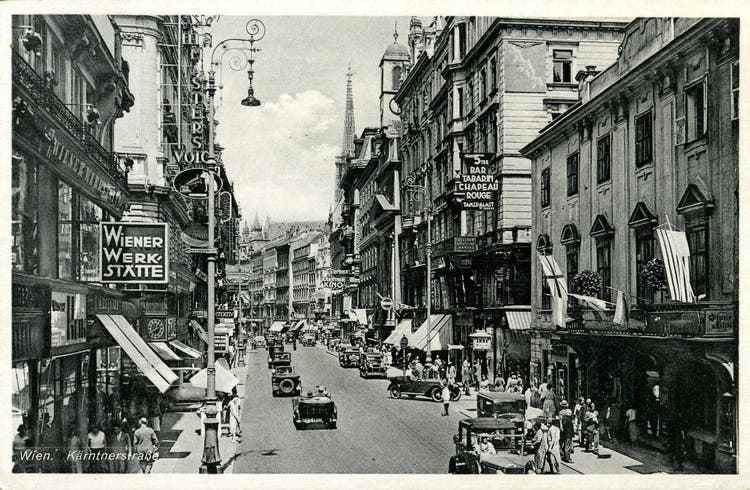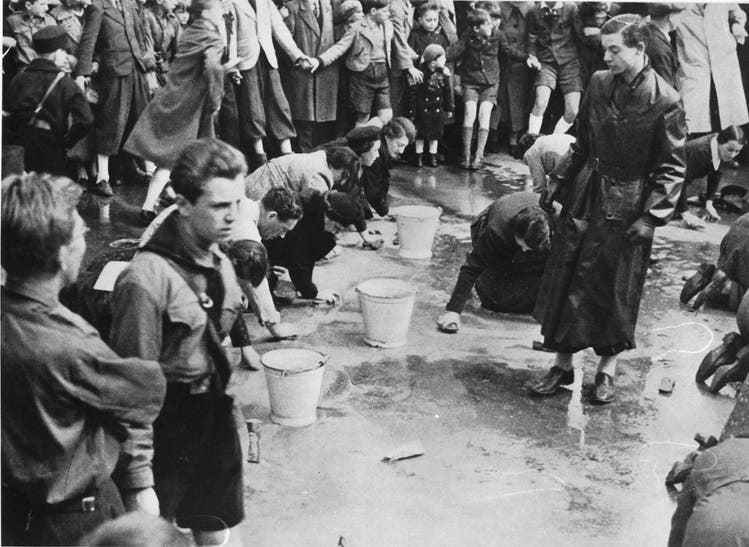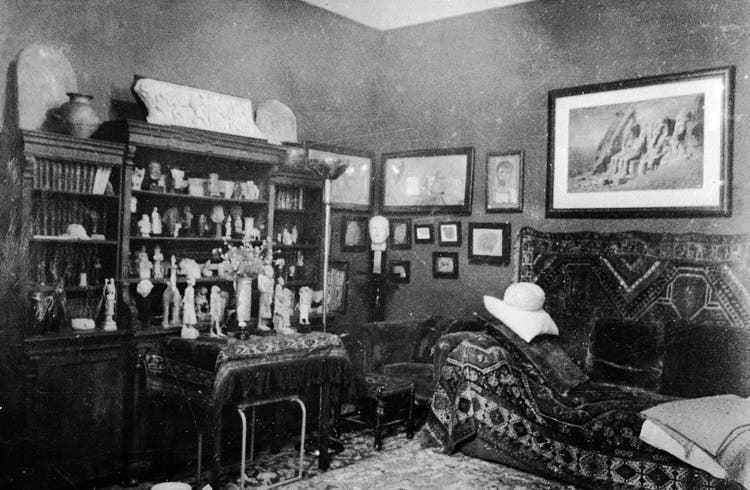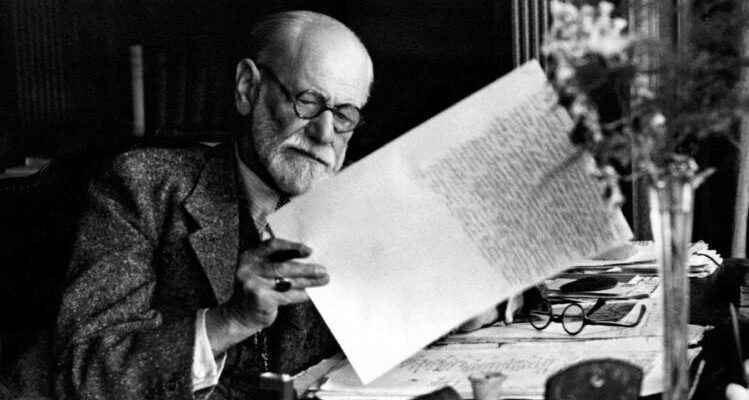It is no coincidence that psychoanalysis had its beginnings in the capital of the Danube monarchy. And it is just as unsurprising that the dark side of consciousness was discovered here and soon supplanted by a fanatical ideology.
Getting to the heart of the human being: Sigmund Freud at his desk.
Before the Second World War, Vienna, the former capital of the Austro-Hungarian Monarchy, was one of the most interesting cities in Europe. As far as fine arts and science were concerned, it was considered one of the most creative urban centers on the old continent. In economic terms, a radical liberalism had been chosen, which defended the libertarian demands and took them uncompromisingly to the extreme. And in another area, the Vienna Psychoanalytic Association (later renamed the International Psychoanalytic Association) was founded – at the express wish of its members, in secret.
While it caused controversy and polemics internally, at the same time it conquered more and more cities and countries relatively unnoticed. The members of the association continued to be active in the years that followed, starting with their spiritus rector Sigmund Freud, who finally realized his old dream: to become a professor at the university where he had studied, thanks to two influential patrons, Hermann Nothnagel and Richard von Krafft-Ebing, who applied for his appointment as associate professor.
As Vienna flourished outwardly, the influence of National Socialism in the neighboring country, especially hatred of the Jews, caused real social devastation. It allowed the opportunists to adopt positions that, day by day, bore more resemblance to the prevailing political order.
This was undoubtedly an interesting phenomenon. While prejudices against the Jews were growing on the streets, a group of respected scientists in the city were discussing a new dimension of life that had not yet found the resonance it would receive in later years. It was a new order, represented by the unconscious, withdrawn from the living world and from anything previously known, a reverse side of consciousness made of suppressed dreams, unspeakable fantasies, and capricious truths.

The fulcrum of the world: Kärntnerstrasse in Vienna around 1930.
Two opposing developments
The reality of this ever-unexpected unconscious created a radical distance between official culture and an almost secretive group of physicians who declared hard-to-prove theories to be an essential reality of individual life and an indisputable fact of human experience.
Even if cultural achievements always have a diverse origin, it is not an unreasonable claim that the phenomenon of psychoanalysis was born in Vienna. Likewise, it is evident that that reality or unreality embodied by the unconscious arose at the same time that a particular society was about to submit politically to a fanatical and base doctrine made up of old prejudices and untruths. It was the same society in which art and science flourished extraordinarily thanks to open politics and new voices and inventions were given a chance.
To this day there are scientists who doubt the existence of the unconscious, and there is still something unsettling about its nature, implying a reality that does not exist. But this insecurity has subsided, and the relative composure towards the unconscious is now part of our living environment. One could say that those who have historically been the least acknowledgment of the unconscious have resigned themselves to accepting its evidence, even if they continue to doubt it at heart.

Vienna, 1938: members of the Hitler Youth force Jews to clean the streets while passers-by look on.
Despite the misunderstanding of many scientists when it was born, the unconscious exists and much of the scientific literature recognizes its raison d’être. Reality has proven it, even if many scientists still refuse to concede any meaning to it. Did the story of its origins, which has never been fully clarified, have anything to do with the character of a “half reality” that is inherent in it? Certainly, but it’s such a difficult subject that many still don’t want to tackle it.
Born in a problematic and controversial moment, the unconscious still exists only half, like a reprimand. Many remain unconvinced of its existence and accept it as one accepts day or night, and only because there is no other way. In extreme cases even like a truth that forces itself on you in an extraordinary and elusive way.
Its existence will always be spectacular, as if it played a crucial role that the unconscious was born in difficult and confusing circumstances, especially in a group that will never be recognized by everyone, especially since it split and even disappeared. The fact that her famous past still has an effect today does not change that.
A liberating force
Who today still believes that the unconscious is the secret stuff that humans are made of and that this stuff is their primary reality? Only a few, even if a large part of science submits to him and finds confirmation in him. Does his fate have anything to do with it?

Where the unconscious lies: Freud’s room on Berggasse with the famous couch.
With the fact, for example, that the unconscious was born in Vienna at a moment when it was soon pushed away again: swept away by an event that within a few years sacrificed every scientific truth to a fanatic and hate-filled reality and silenced it . Another truth should replace it. If the unconscious had been born in England or France and not in Vienna, there would not be so many doubts. Its existence seems to be determined by the place of its creation.
Despite everything, nobody dares to openly deny the unconscious. The skepticism towards him cannot harm him, because it can be proven often enough. It shows up or can be suspected behind many aspects of life, even if its existence in other areas raises great doubts, since it is not as obvious as stars or stones are, i.e. it does not have the properties with which other realities assert themselves .
Its truth is distorted and revealed in an indirect way, as if dependent on and clinging to other realities, as if it were an integral part of them. The unconscious is like that, it is a reality that will always be in doubt, as if its distant origin were part of it and its nature always precarious.
And yet people would be less free without the unconscious. The extraordinary thing about it is that it doesn’t exist anywhere else. Is it this vagueness that defines us? Perhaps, and it cannot be ruled out either, that it is his birth under such adverse circumstances that veils his open and free nature. For while it was being discovered, the worst excesses of barbarism were taking place. And self-denying Europe marveled at the outstanding sponsors it had. The reality of the unconscious is a truth that is ambiguous and yet will always be unshakable, so that one can fall back on it just when there should be nothing else.
The Nobel Prize for Literature Mario Vargas Llosa was born in Peru in 1936 and has been living in Madrid for almost three decades. © Mario Vargas Llosa, 2022. – Translated from Spanish by Carsten Regling.
